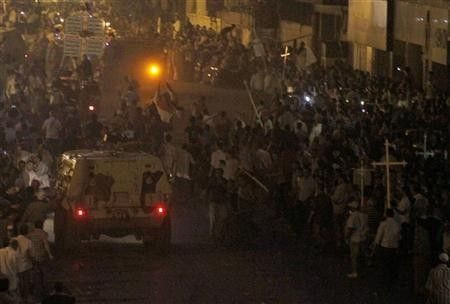Egyptian Junta Throttles Democracy Movement, Sends Blogger to Military Trial

Egyptians fought valiantly to remove a ruler who ran a police state, but the pro-democracy movement has been throttled successfully by the military junta that replaced Hosni Mubarak.
With 12,000 pro-democracy activists having been sent to military trial since the junta took the reins Feb. 11 and an oppressive law that criminalizes strikes and protest marches put in place, Egyptians are wondering if this was the emancipation they had risked their lives to achieve.
The junta has now sent a prominent member of the pro-democracy movement to military trial on charges of inciting violence. Alaa Abd El Fattah, who played a key role in the anti-Mubarak uprising, had spoken out against military rule and exposed its role in the bloodshed at a Coptic Christian protest march last month.
Reports say he had been called to the infamous Cairo headquarters of the military prosecutors. El Fattah refused to cooperate with the prosecutors and refused to accept their authority, and media reports say he now faces a 15-day detention.
The military accuses El Fattah and dozens of other pro-democracy activists of fomenting violence at the protest. But El Fattah has said it is the army that carried out the massacre.
They committed a massacre, a horrible crime, and now they are working on framing someone else for it. ... This whole situation is distorted. Instead of launching a proper investigation, they are sending activists to trial for saying the plain truth, and that is that the army committed a crime in cold blood, he told The Guardian.
As heat and dust settled at Cairo's Tahrir Square, the focal point of last winter's revolution, the military trained its guns on the dissidents like El Fattah.
Rights groups had reported immediately in the aftermath of the fall of Mubarak that military rulers had engaged in detentions and the torture of activists.
Activists of the Muslim Brotherhood, which was the main opposition to Mubarak for a long time, have said the military rule has defied the logic of the uprising and the ouster of Mubarak. “It is totally unacceptable what we are witnessing as political activists are being referred to military trials and interrogations despite being civilians, a Brotherhood leader was quoted on the movement's Web site.
“The military’s stance towards the activists is similar to the methods practiced during the Mubarak era which continued to refer innocent civilians to military trials, said the leader, Ammar Beltagy.
We reject military trials for civilians ... and we also strenuously reject any form of crackdown against citizens because of their free expression of opinions, said Khairat El Shater, vice chairman of the Muslim Brotherhood.
© Copyright IBTimes 2024. All rights reserved.





















